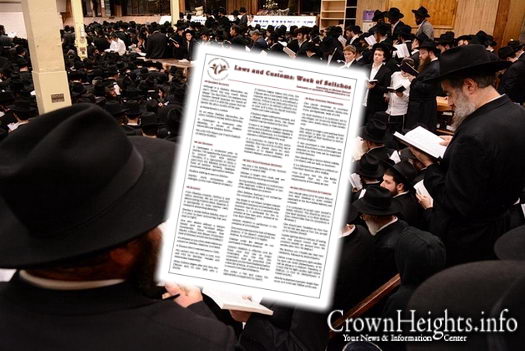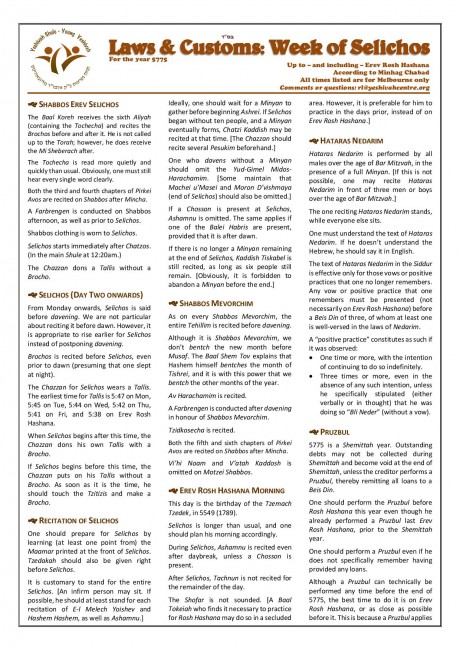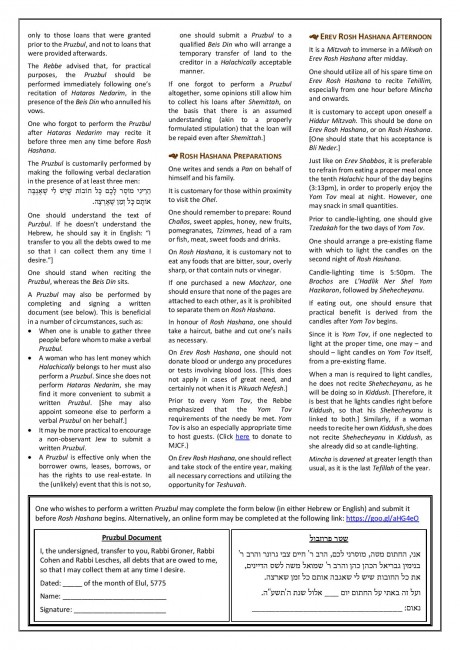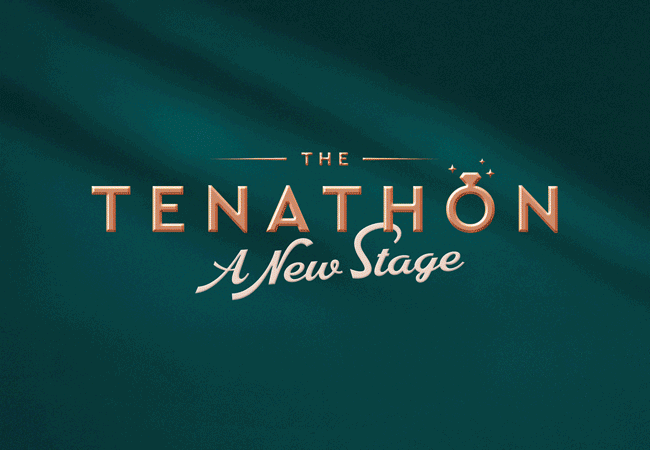
Laws and Customs: Week of Selichos, Pruzbul
Rabbi Shmuel Lesches, Magid Shiur in the Yeshiva Gedola of Melbourne, Australia, has compiled a guide to the laws and customs of the week of Selichos, including Erev Rosh Hashana and Pruzbul, for the benefit of the wider Lubavitch community.
Click on the image below to enlarge the text, or here to view in PDF format.
Please note: All times listed are for Melbourne only.



















Michoel
It is not so simple that “Brochos is recited before Selichos, even prior to dawn (presuming that one slept
at night)”. In the siddur (halochos prior to birkos hashachar) it says that you can say the birkos hashachar before dawn ONLY if “nischayev bohen”. This means that you heard a rooster etc.
On the other hand birkos ha’torah can be recited “(presuming that one slept
at night)”
Ezra
“Nischayev bohen” in the Alter Rebbe’s wording means that you slept during the night, not that you heard a rooster or the like. Thus he says: אלא שאם ניעור כל הלילה ולא נתחייב בהן… אבל אם ישן בלילה ונתחייב בהן.
So only if you stayed up all night would you have to wait with birchos hashachar until dawn.
To Michoel
The Rebbe’s Hoiraah was different to what it says in the Siddur.
Milhouse
What are you talking about? The siddur says the exact opposite of what you claim, and exactly what Rabbi Lesches wrote. If one slept at night one can say all the brochos upon waking, even before dawn, and even if one was not nischayev bohen. Only if one did not sleep must one wait for dawn or for the chiyuv to arise.
Milhouse
Ezra, I don’t think you’re right that נתחייב בהן means having slept. The Alter Rebbe seems to say that there are three independent triggers for brochos:
1. Having slept, and woken up after midnight.
2. Having the experience for which that brocho was instituted, after midnight.
3. Alos hashachar.
So if you sleep then you say all the brochos when you wake up, no matter how early it is. If you didn’t sleep, but you hear a rooster, change your clothes, etc., you can say those brochos. If neither of these apply, then you say all the brochos at dawn.
Michoel
Where can I read this Hoiroah? Its not in brought Shevach Mo’adim nor in Shulchan Menachem…..
Saying a Brocho, with Hashems name, when one is not chayov, can be an Issur D’oriaso…
This is why I wrote this comment,
Mashpia
According the AR it’s a Derabanan. Now calm down and learn your stuff.
Michoel
Firstly, for those who are miss understanding what the siddur says “v’nischeyev bohen” look in Kztois Hashulchon 5/6 where he clearly explains what nischayev bohen means when you sleep at night and wake up before alois. And therefore, only if you hear a rooster before alois do you say the first brocho etc.
Secondly, AR writes in in 215/3 that a brocho she’eino tzricho “hrie zeh noise shem shomayim lashov” (see also Tanya Igeres Hatshuva 11). However, because he writes after that if its “b’derech brocho” its osur m’drabonon I wrote that it “can be an Issur D’oriaso…”
Milhouse
Michoel, that is what it says in Badei Hashulchon, but it’s not compatible with the Alter Rebbe’s loshon. The Alter Rebbe says clearly that if you did not sleep, then if you hear a rooster you say the brocho then, and if not then you say it at alos hashachar; but if you did sleep you say it when you wake up. The Badei Hashulchon’s reading, that “lirevuso nokat”, is just not tenable.
The bottom line is as Rabbi Lesches wrote. If you slept and woke up after midnight, you are automatically chayav in all the brochos. If you didn’t sleep, then the chiyuv of each brocho comes when you experience that thing after midnight, or at alos hashachar, whichever comes first.
Michoel
The bottom line is that the colel chabad luach (p68) says that Rabbi Lesches is wrong. It says that if you wake up after midnight but did not hear a rooster, you need to wait until alois hashachar to say that brocho etc.
Milhouse
Which is not surprising, since we’ve already seen his opinion in Badei Hashulchon that when the Alter Rebbe wrote ואם ניעור כל הלילה ושמע קול תרנגול מחצות ואילך יכול לברך, he didn’t really mean it; what he really meant, says the Badei Hashulchon was ואפילו ניעור כל הלילה, and לרבותא נקט. If you truly and honestly think that reading is tenable, then good luck, but I don’t think it is, and I suppose R Lesches doesn’t consider it tenable either.